Corporate Social Responsibility Report: Tata vs Toyota Analysis
VerifiedAdded on 2019/11/26
|11
|2862
|330
Report
AI Summary
This report provides a comprehensive analysis of the corporate social responsibility (CSR) practices of Tata Motors (India) and Toyota (Australia). It begins by describing the businesses of both companies, highlighting their operations and market presence. The report then identifies key differences between the two companies, focusing on factors such as business environments, media coverage, and government influence. It explores the reasons behind these differences, considering economic conditions, government regulations, and cultural aspects. The quality of the social accounting approach used by each company is assessed, examining their stakeholder engagement and risk management strategies. The stated values of both companies are discussed, considering their financial performance and market position. The report concludes with a reflection on group discussions, summarizing key findings and providing insights into the companies' CSR performance. The report utilizes various sources to support its claims and provide a well-rounded perspective on CSR in the automotive industry.
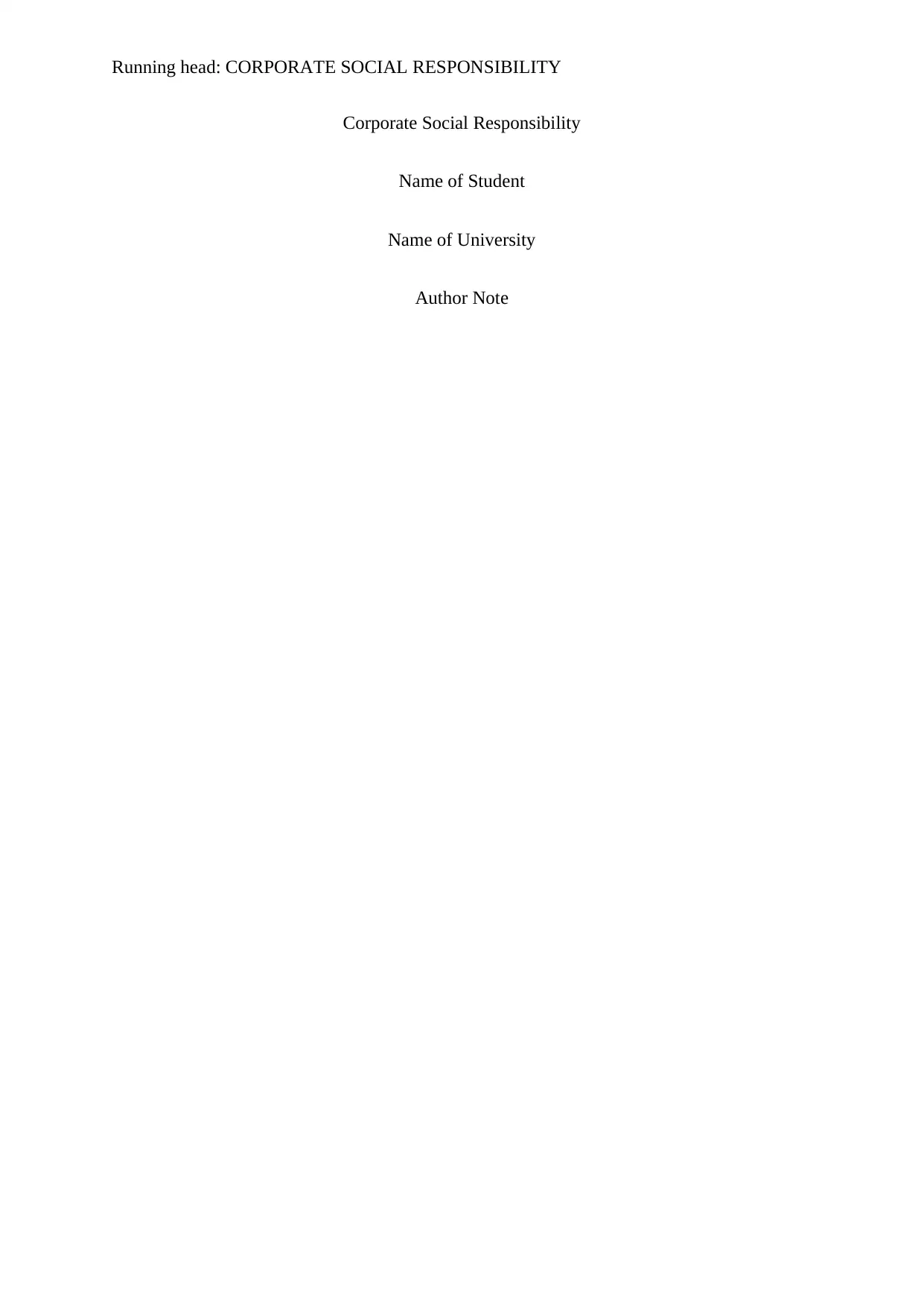
Running head: CORPORATE SOCIAL RESPONSIBILITY
Corporate Social Responsibility
Name of Student
Name of University
Author Note
Corporate Social Responsibility
Name of Student
Name of University
Author Note
Paraphrase This Document
Need a fresh take? Get an instant paraphrase of this document with our AI Paraphraser
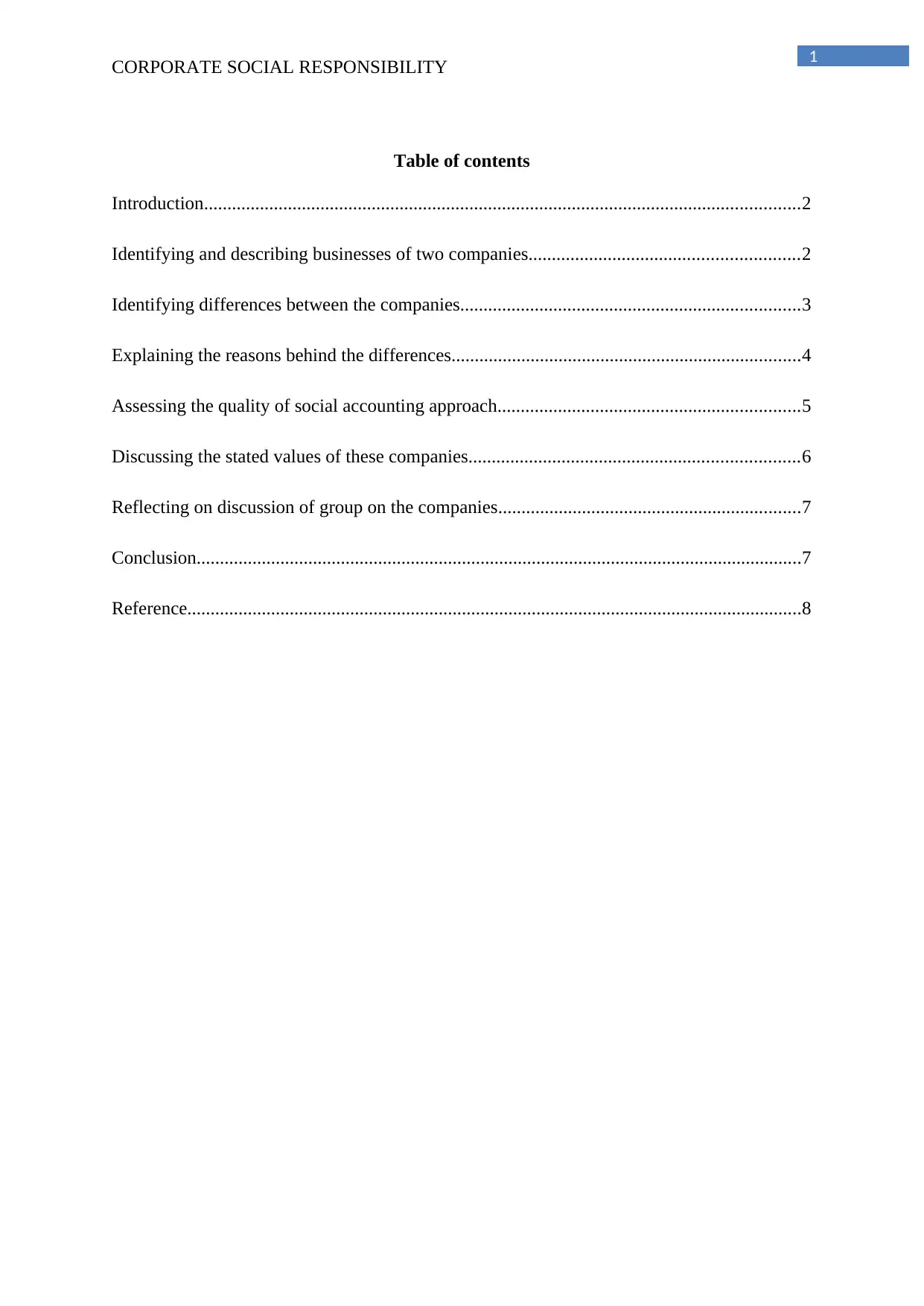
1
CORPORATE SOCIAL RESPONSIBILITY
Table of contents
Introduction................................................................................................................................2
Identifying and describing businesses of two companies..........................................................2
Identifying differences between the companies.........................................................................3
Explaining the reasons behind the differences...........................................................................4
Assessing the quality of social accounting approach.................................................................5
Discussing the stated values of these companies.......................................................................6
Reflecting on discussion of group on the companies.................................................................7
Conclusion..................................................................................................................................7
Reference....................................................................................................................................8
CORPORATE SOCIAL RESPONSIBILITY
Table of contents
Introduction................................................................................................................................2
Identifying and describing businesses of two companies..........................................................2
Identifying differences between the companies.........................................................................3
Explaining the reasons behind the differences...........................................................................4
Assessing the quality of social accounting approach.................................................................5
Discussing the stated values of these companies.......................................................................6
Reflecting on discussion of group on the companies.................................................................7
Conclusion..................................................................................................................................7
Reference....................................................................................................................................8
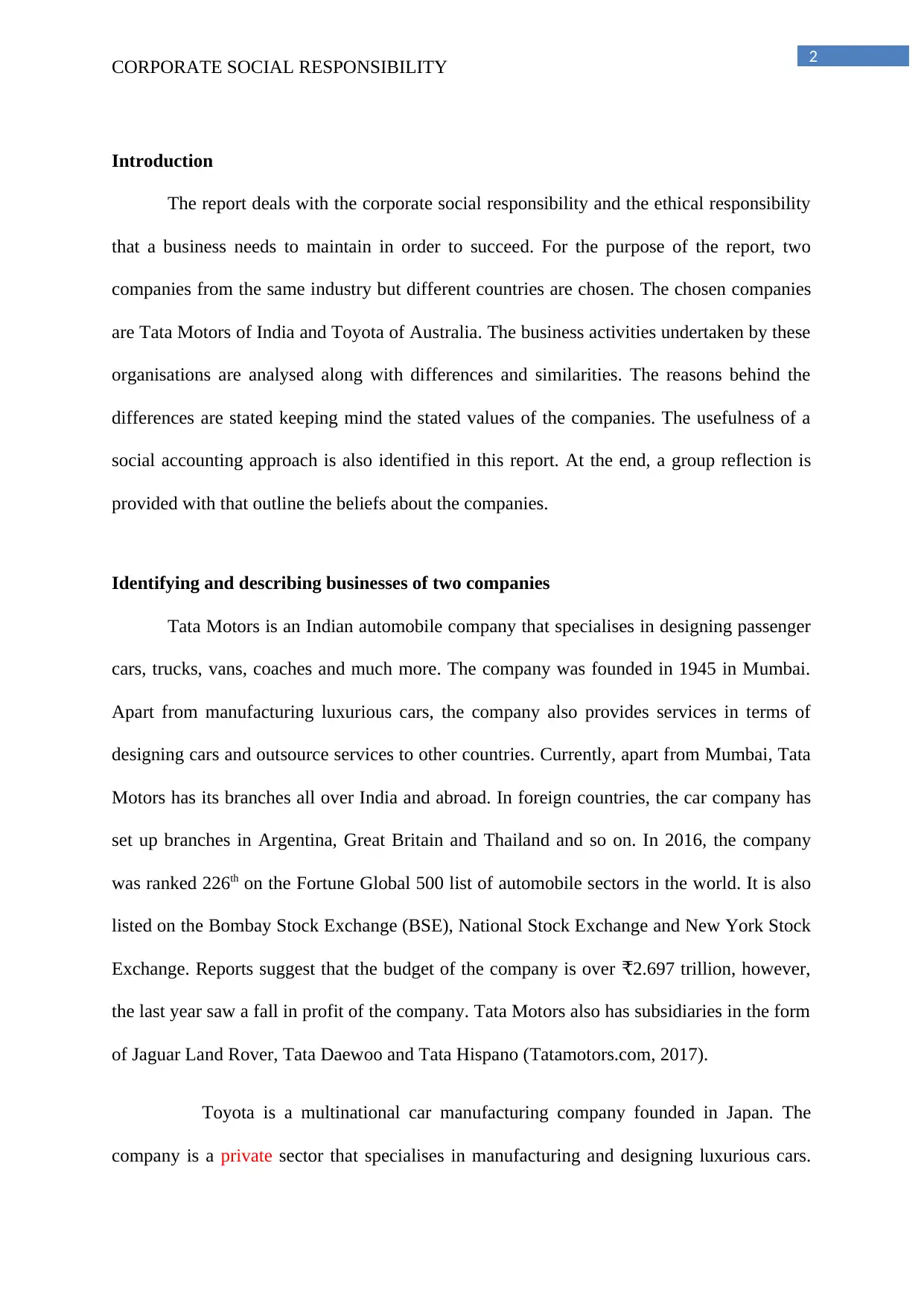
2
CORPORATE SOCIAL RESPONSIBILITY
Introduction
The report deals with the corporate social responsibility and the ethical responsibility
that a business needs to maintain in order to succeed. For the purpose of the report, two
companies from the same industry but different countries are chosen. The chosen companies
are Tata Motors of India and Toyota of Australia. The business activities undertaken by these
organisations are analysed along with differences and similarities. The reasons behind the
differences are stated keeping mind the stated values of the companies. The usefulness of a
social accounting approach is also identified in this report. At the end, a group reflection is
provided with that outline the beliefs about the companies.
Identifying and describing businesses of two companies
Tata Motors is an Indian automobile company that specialises in designing passenger
cars, trucks, vans, coaches and much more. The company was founded in 1945 in Mumbai.
Apart from manufacturing luxurious cars, the company also provides services in terms of
designing cars and outsource services to other countries. Currently, apart from Mumbai, Tata
Motors has its branches all over India and abroad. In foreign countries, the car company has
set up branches in Argentina, Great Britain and Thailand and so on. In 2016, the company
was ranked 226th on the Fortune Global 500 list of automobile sectors in the world. It is also
listed on the Bombay Stock Exchange (BSE), National Stock Exchange and New York Stock
Exchange. Reports suggest that the budget of the company is over 2.697 trillion, however,₹
the last year saw a fall in profit of the company. Tata Motors also has subsidiaries in the form
of Jaguar Land Rover, Tata Daewoo and Tata Hispano (Tatamotors.com, 2017).
Toyota is a multinational car manufacturing company founded in Japan. The
company is a private sector that specialises in manufacturing and designing luxurious cars.
CORPORATE SOCIAL RESPONSIBILITY
Introduction
The report deals with the corporate social responsibility and the ethical responsibility
that a business needs to maintain in order to succeed. For the purpose of the report, two
companies from the same industry but different countries are chosen. The chosen companies
are Tata Motors of India and Toyota of Australia. The business activities undertaken by these
organisations are analysed along with differences and similarities. The reasons behind the
differences are stated keeping mind the stated values of the companies. The usefulness of a
social accounting approach is also identified in this report. At the end, a group reflection is
provided with that outline the beliefs about the companies.
Identifying and describing businesses of two companies
Tata Motors is an Indian automobile company that specialises in designing passenger
cars, trucks, vans, coaches and much more. The company was founded in 1945 in Mumbai.
Apart from manufacturing luxurious cars, the company also provides services in terms of
designing cars and outsource services to other countries. Currently, apart from Mumbai, Tata
Motors has its branches all over India and abroad. In foreign countries, the car company has
set up branches in Argentina, Great Britain and Thailand and so on. In 2016, the company
was ranked 226th on the Fortune Global 500 list of automobile sectors in the world. It is also
listed on the Bombay Stock Exchange (BSE), National Stock Exchange and New York Stock
Exchange. Reports suggest that the budget of the company is over 2.697 trillion, however,₹
the last year saw a fall in profit of the company. Tata Motors also has subsidiaries in the form
of Jaguar Land Rover, Tata Daewoo and Tata Hispano (Tatamotors.com, 2017).
Toyota is a multinational car manufacturing company founded in Japan. The
company is a private sector that specialises in manufacturing and designing luxurious cars.
⊘ This is a preview!⊘
Do you want full access?
Subscribe today to unlock all pages.

Trusted by 1+ million students worldwide
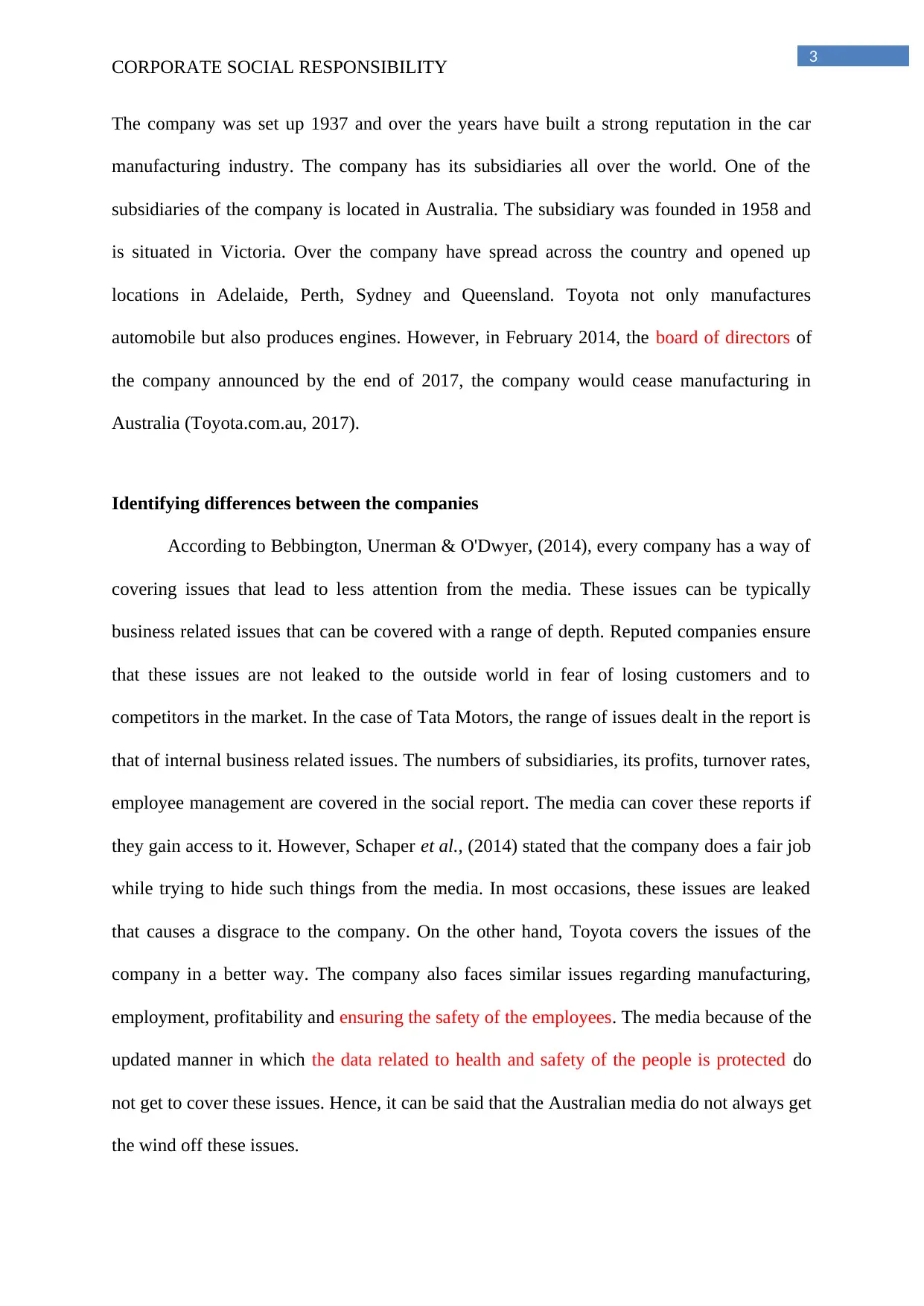
3
CORPORATE SOCIAL RESPONSIBILITY
The company was set up 1937 and over the years have built a strong reputation in the car
manufacturing industry. The company has its subsidiaries all over the world. One of the
subsidiaries of the company is located in Australia. The subsidiary was founded in 1958 and
is situated in Victoria. Over the company have spread across the country and opened up
locations in Adelaide, Perth, Sydney and Queensland. Toyota not only manufactures
automobile but also produces engines. However, in February 2014, the board of directors of
the company announced by the end of 2017, the company would cease manufacturing in
Australia (Toyota.com.au, 2017).
Identifying differences between the companies
According to Bebbington, Unerman & O'Dwyer, (2014), every company has a way of
covering issues that lead to less attention from the media. These issues can be typically
business related issues that can be covered with a range of depth. Reputed companies ensure
that these issues are not leaked to the outside world in fear of losing customers and to
competitors in the market. In the case of Tata Motors, the range of issues dealt in the report is
that of internal business related issues. The numbers of subsidiaries, its profits, turnover rates,
employee management are covered in the social report. The media can cover these reports if
they gain access to it. However, Schaper et al., (2014) stated that the company does a fair job
while trying to hide such things from the media. In most occasions, these issues are leaked
that causes a disgrace to the company. On the other hand, Toyota covers the issues of the
company in a better way. The company also faces similar issues regarding manufacturing,
employment, profitability and ensuring the safety of the employees. The media because of the
updated manner in which the data related to health and safety of the people is protected do
not get to cover these issues. Hence, it can be said that the Australian media do not always get
the wind off these issues.
CORPORATE SOCIAL RESPONSIBILITY
The company was set up 1937 and over the years have built a strong reputation in the car
manufacturing industry. The company has its subsidiaries all over the world. One of the
subsidiaries of the company is located in Australia. The subsidiary was founded in 1958 and
is situated in Victoria. Over the company have spread across the country and opened up
locations in Adelaide, Perth, Sydney and Queensland. Toyota not only manufactures
automobile but also produces engines. However, in February 2014, the board of directors of
the company announced by the end of 2017, the company would cease manufacturing in
Australia (Toyota.com.au, 2017).
Identifying differences between the companies
According to Bebbington, Unerman & O'Dwyer, (2014), every company has a way of
covering issues that lead to less attention from the media. These issues can be typically
business related issues that can be covered with a range of depth. Reputed companies ensure
that these issues are not leaked to the outside world in fear of losing customers and to
competitors in the market. In the case of Tata Motors, the range of issues dealt in the report is
that of internal business related issues. The numbers of subsidiaries, its profits, turnover rates,
employee management are covered in the social report. The media can cover these reports if
they gain access to it. However, Schaper et al., (2014) stated that the company does a fair job
while trying to hide such things from the media. In most occasions, these issues are leaked
that causes a disgrace to the company. On the other hand, Toyota covers the issues of the
company in a better way. The company also faces similar issues regarding manufacturing,
employment, profitability and ensuring the safety of the employees. The media because of the
updated manner in which the data related to health and safety of the people is protected do
not get to cover these issues. Hence, it can be said that the Australian media do not always get
the wind off these issues.
Paraphrase This Document
Need a fresh take? Get an instant paraphrase of this document with our AI Paraphraser
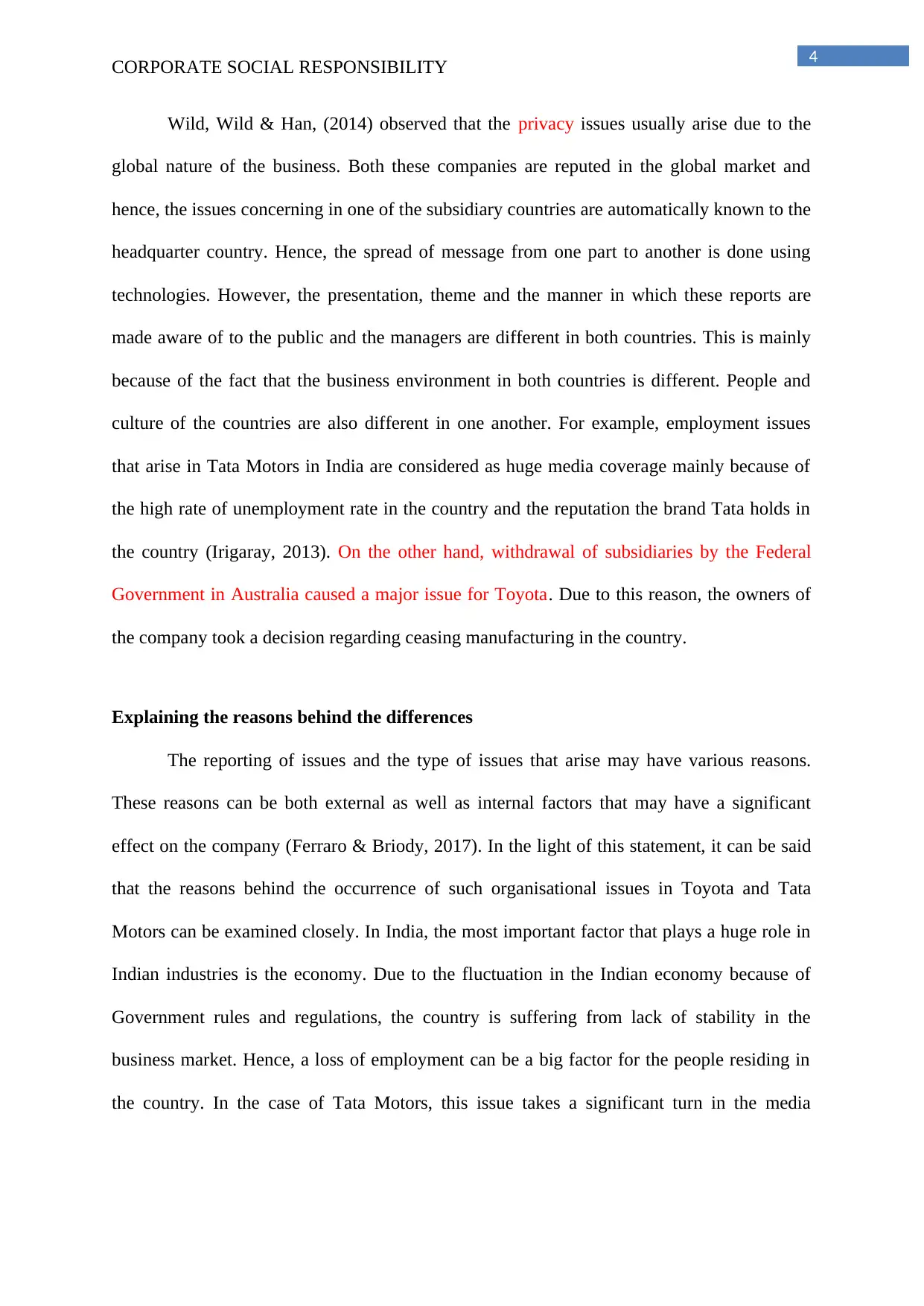
4
CORPORATE SOCIAL RESPONSIBILITY
Wild, Wild & Han, (2014) observed that the privacy issues usually arise due to the
global nature of the business. Both these companies are reputed in the global market and
hence, the issues concerning in one of the subsidiary countries are automatically known to the
headquarter country. Hence, the spread of message from one part to another is done using
technologies. However, the presentation, theme and the manner in which these reports are
made aware of to the public and the managers are different in both countries. This is mainly
because of the fact that the business environment in both countries is different. People and
culture of the countries are also different in one another. For example, employment issues
that arise in Tata Motors in India are considered as huge media coverage mainly because of
the high rate of unemployment rate in the country and the reputation the brand Tata holds in
the country (Irigaray, 2013). On the other hand, withdrawal of subsidiaries by the Federal
Government in Australia caused a major issue for Toyota. Due to this reason, the owners of
the company took a decision regarding ceasing manufacturing in the country.
Explaining the reasons behind the differences
The reporting of issues and the type of issues that arise may have various reasons.
These reasons can be both external as well as internal factors that may have a significant
effect on the company (Ferraro & Briody, 2017). In the light of this statement, it can be said
that the reasons behind the occurrence of such organisational issues in Toyota and Tata
Motors can be examined closely. In India, the most important factor that plays a huge role in
Indian industries is the economy. Due to the fluctuation in the Indian economy because of
Government rules and regulations, the country is suffering from lack of stability in the
business market. Hence, a loss of employment can be a big factor for the people residing in
the country. In the case of Tata Motors, this issue takes a significant turn in the media
CORPORATE SOCIAL RESPONSIBILITY
Wild, Wild & Han, (2014) observed that the privacy issues usually arise due to the
global nature of the business. Both these companies are reputed in the global market and
hence, the issues concerning in one of the subsidiary countries are automatically known to the
headquarter country. Hence, the spread of message from one part to another is done using
technologies. However, the presentation, theme and the manner in which these reports are
made aware of to the public and the managers are different in both countries. This is mainly
because of the fact that the business environment in both countries is different. People and
culture of the countries are also different in one another. For example, employment issues
that arise in Tata Motors in India are considered as huge media coverage mainly because of
the high rate of unemployment rate in the country and the reputation the brand Tata holds in
the country (Irigaray, 2013). On the other hand, withdrawal of subsidiaries by the Federal
Government in Australia caused a major issue for Toyota. Due to this reason, the owners of
the company took a decision regarding ceasing manufacturing in the country.
Explaining the reasons behind the differences
The reporting of issues and the type of issues that arise may have various reasons.
These reasons can be both external as well as internal factors that may have a significant
effect on the company (Ferraro & Briody, 2017). In the light of this statement, it can be said
that the reasons behind the occurrence of such organisational issues in Toyota and Tata
Motors can be examined closely. In India, the most important factor that plays a huge role in
Indian industries is the economy. Due to the fluctuation in the Indian economy because of
Government rules and regulations, the country is suffering from lack of stability in the
business market. Hence, a loss of employment can be a big factor for the people residing in
the country. In the case of Tata Motors, this issue takes a significant turn in the media
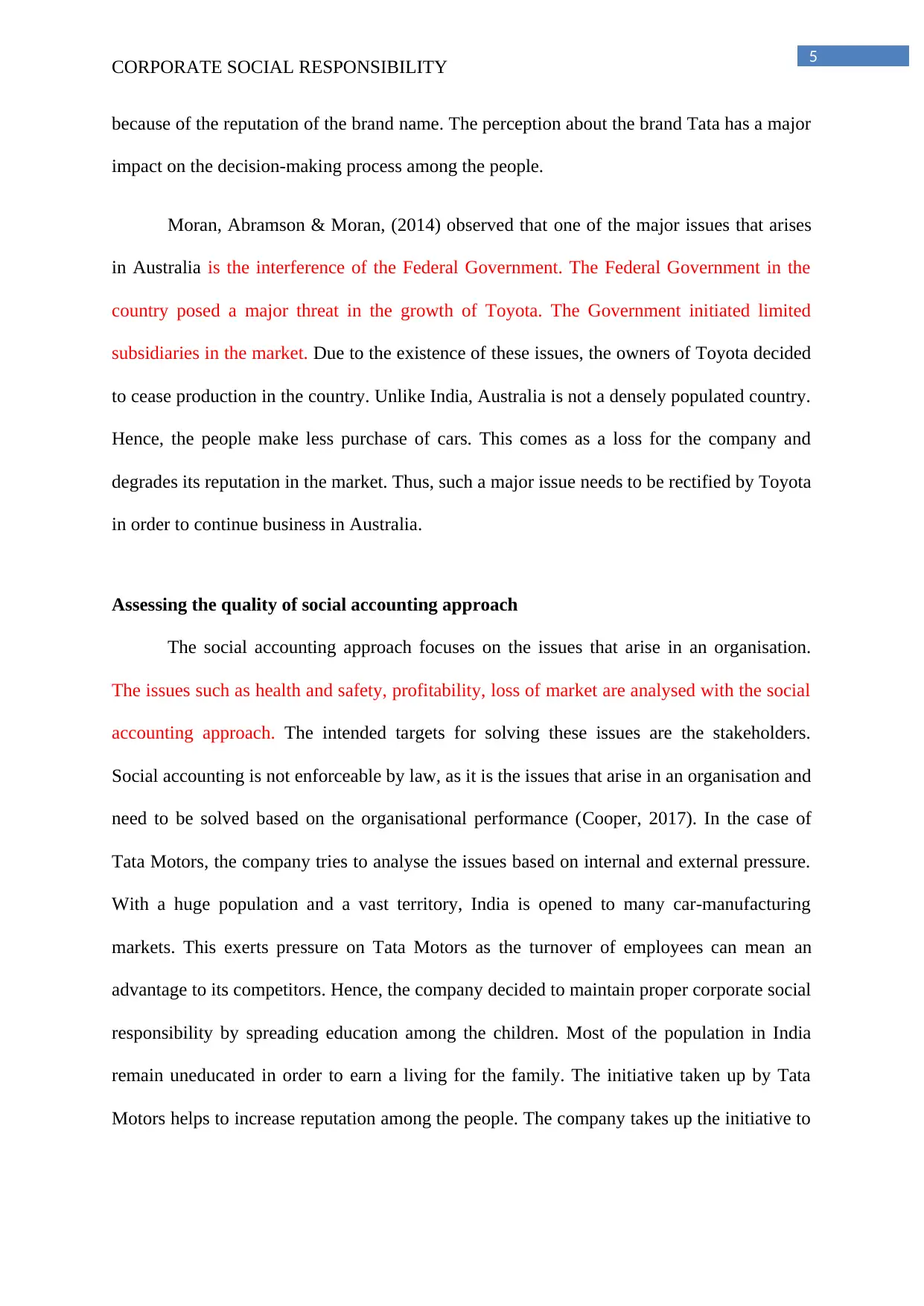
5
CORPORATE SOCIAL RESPONSIBILITY
because of the reputation of the brand name. The perception about the brand Tata has a major
impact on the decision-making process among the people.
Moran, Abramson & Moran, (2014) observed that one of the major issues that arises
in Australia is the interference of the Federal Government. The Federal Government in the
country posed a major threat in the growth of Toyota. The Government initiated limited
subsidiaries in the market. Due to the existence of these issues, the owners of Toyota decided
to cease production in the country. Unlike India, Australia is not a densely populated country.
Hence, the people make less purchase of cars. This comes as a loss for the company and
degrades its reputation in the market. Thus, such a major issue needs to be rectified by Toyota
in order to continue business in Australia.
Assessing the quality of social accounting approach
The social accounting approach focuses on the issues that arise in an organisation.
The issues such as health and safety, profitability, loss of market are analysed with the social
accounting approach. The intended targets for solving these issues are the stakeholders.
Social accounting is not enforceable by law, as it is the issues that arise in an organisation and
need to be solved based on the organisational performance (Cooper, 2017). In the case of
Tata Motors, the company tries to analyse the issues based on internal and external pressure.
With a huge population and a vast territory, India is opened to many car-manufacturing
markets. This exerts pressure on Tata Motors as the turnover of employees can mean an
advantage to its competitors. Hence, the company decided to maintain proper corporate social
responsibility by spreading education among the children. Most of the population in India
remain uneducated in order to earn a living for the family. The initiative taken up by Tata
Motors helps to increase reputation among the people. The company takes up the initiative to
CORPORATE SOCIAL RESPONSIBILITY
because of the reputation of the brand name. The perception about the brand Tata has a major
impact on the decision-making process among the people.
Moran, Abramson & Moran, (2014) observed that one of the major issues that arises
in Australia is the interference of the Federal Government. The Federal Government in the
country posed a major threat in the growth of Toyota. The Government initiated limited
subsidiaries in the market. Due to the existence of these issues, the owners of Toyota decided
to cease production in the country. Unlike India, Australia is not a densely populated country.
Hence, the people make less purchase of cars. This comes as a loss for the company and
degrades its reputation in the market. Thus, such a major issue needs to be rectified by Toyota
in order to continue business in Australia.
Assessing the quality of social accounting approach
The social accounting approach focuses on the issues that arise in an organisation.
The issues such as health and safety, profitability, loss of market are analysed with the social
accounting approach. The intended targets for solving these issues are the stakeholders.
Social accounting is not enforceable by law, as it is the issues that arise in an organisation and
need to be solved based on the organisational performance (Cooper, 2017). In the case of
Tata Motors, the company tries to analyse the issues based on internal and external pressure.
With a huge population and a vast territory, India is opened to many car-manufacturing
markets. This exerts pressure on Tata Motors as the turnover of employees can mean an
advantage to its competitors. Hence, the company decided to maintain proper corporate social
responsibility by spreading education among the children. Most of the population in India
remain uneducated in order to earn a living for the family. The initiative taken up by Tata
Motors helps to increase reputation among the people. The company takes up the initiative to
⊘ This is a preview!⊘
Do you want full access?
Subscribe today to unlock all pages.

Trusted by 1+ million students worldwide
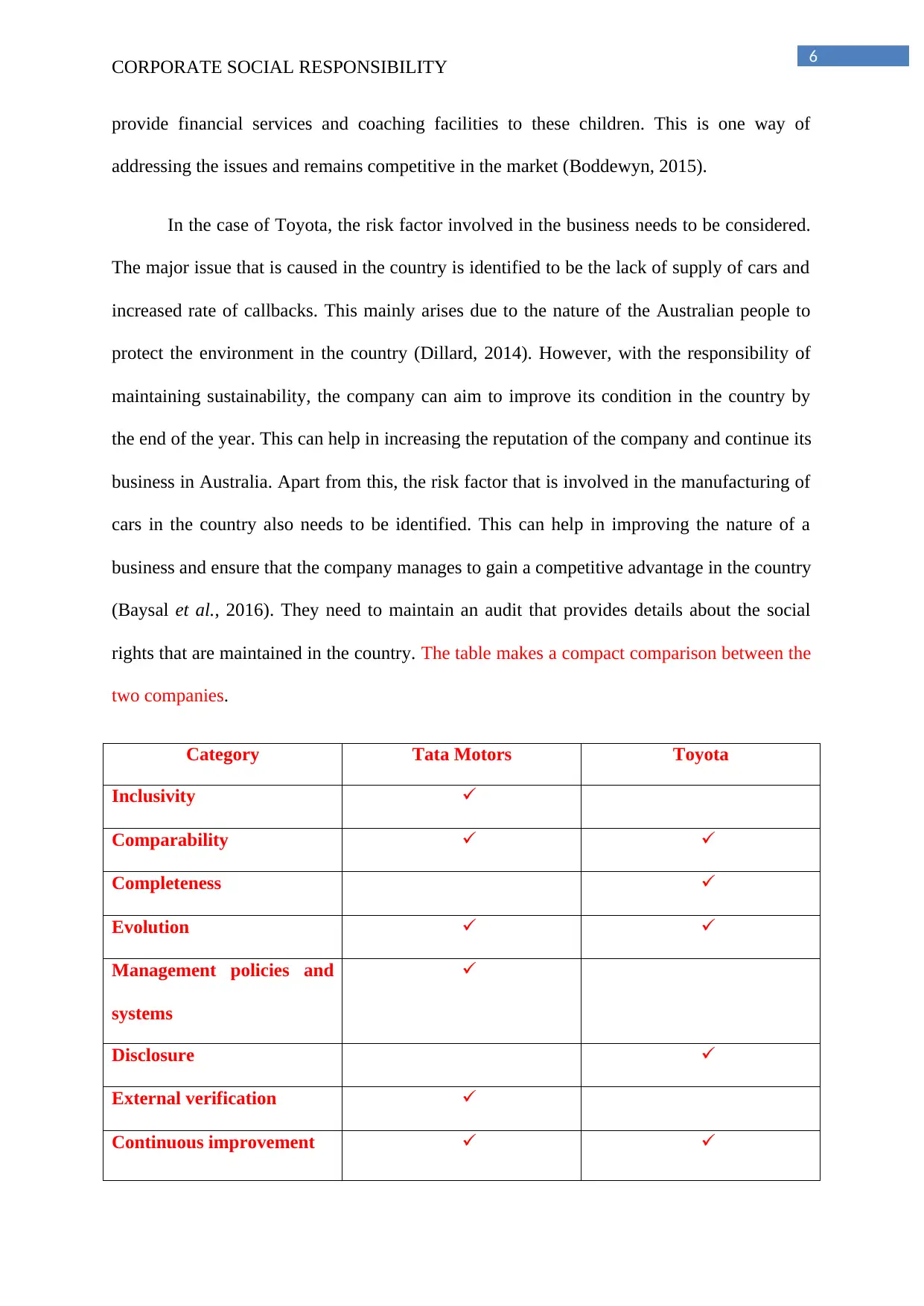
6
CORPORATE SOCIAL RESPONSIBILITY
provide financial services and coaching facilities to these children. This is one way of
addressing the issues and remains competitive in the market (Boddewyn, 2015).
In the case of Toyota, the risk factor involved in the business needs to be considered.
The major issue that is caused in the country is identified to be the lack of supply of cars and
increased rate of callbacks. This mainly arises due to the nature of the Australian people to
protect the environment in the country (Dillard, 2014). However, with the responsibility of
maintaining sustainability, the company can aim to improve its condition in the country by
the end of the year. This can help in increasing the reputation of the company and continue its
business in Australia. Apart from this, the risk factor that is involved in the manufacturing of
cars in the country also needs to be identified. This can help in improving the nature of a
business and ensure that the company manages to gain a competitive advantage in the country
(Baysal et al., 2016). They need to maintain an audit that provides details about the social
rights that are maintained in the country. The table makes a compact comparison between the
two companies.
Category Tata Motors Toyota
Inclusivity
Comparability
Completeness
Evolution
Management policies and
systems
Disclosure
External verification
Continuous improvement
CORPORATE SOCIAL RESPONSIBILITY
provide financial services and coaching facilities to these children. This is one way of
addressing the issues and remains competitive in the market (Boddewyn, 2015).
In the case of Toyota, the risk factor involved in the business needs to be considered.
The major issue that is caused in the country is identified to be the lack of supply of cars and
increased rate of callbacks. This mainly arises due to the nature of the Australian people to
protect the environment in the country (Dillard, 2014). However, with the responsibility of
maintaining sustainability, the company can aim to improve its condition in the country by
the end of the year. This can help in increasing the reputation of the company and continue its
business in Australia. Apart from this, the risk factor that is involved in the manufacturing of
cars in the country also needs to be identified. This can help in improving the nature of a
business and ensure that the company manages to gain a competitive advantage in the country
(Baysal et al., 2016). They need to maintain an audit that provides details about the social
rights that are maintained in the country. The table makes a compact comparison between the
two companies.
Category Tata Motors Toyota
Inclusivity
Comparability
Completeness
Evolution
Management policies and
systems
Disclosure
External verification
Continuous improvement
Paraphrase This Document
Need a fresh take? Get an instant paraphrase of this document with our AI Paraphraser
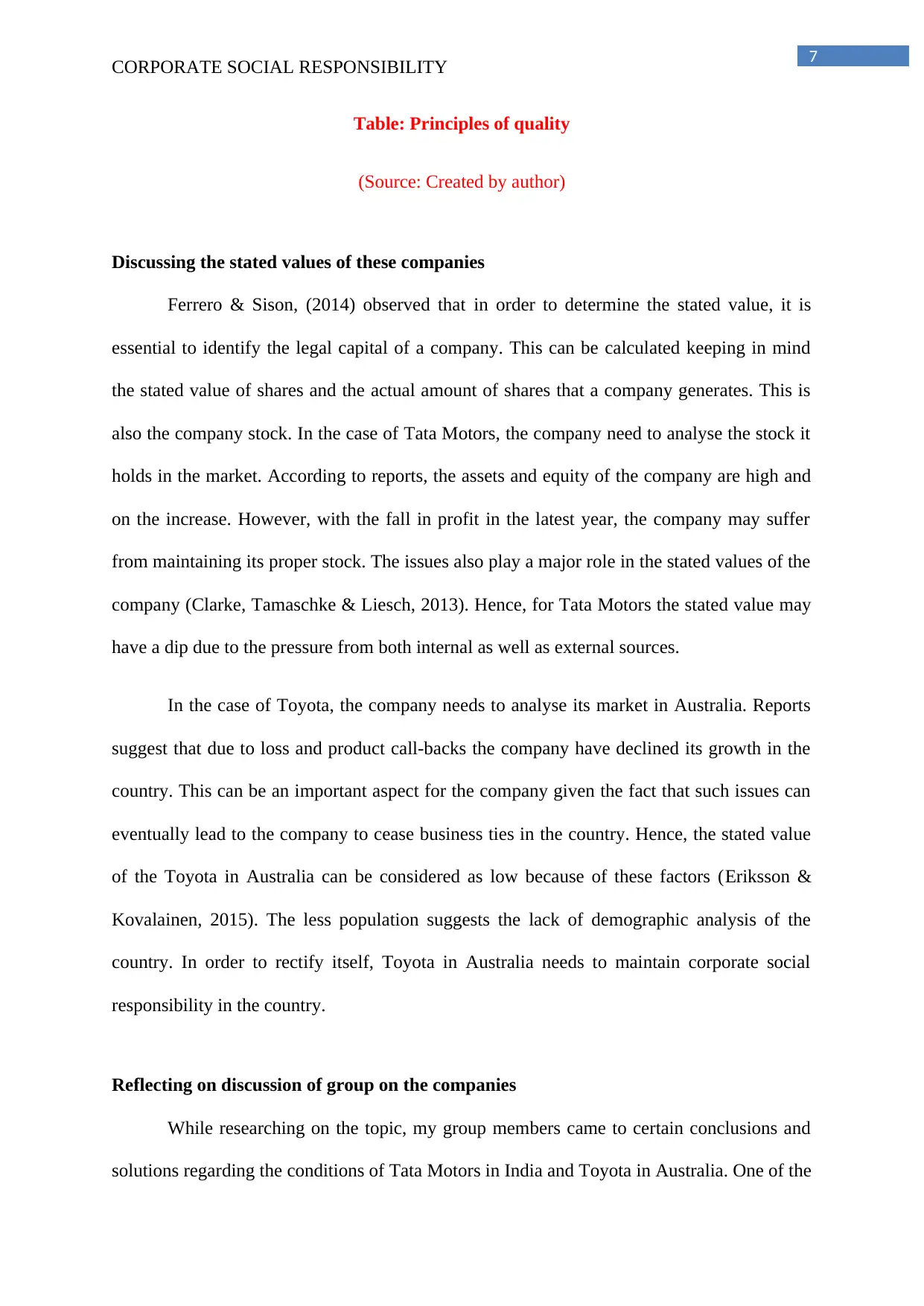
7
CORPORATE SOCIAL RESPONSIBILITY
Table: Principles of quality
(Source: Created by author)
Discussing the stated values of these companies
Ferrero & Sison, (2014) observed that in order to determine the stated value, it is
essential to identify the legal capital of a company. This can be calculated keeping in mind
the stated value of shares and the actual amount of shares that a company generates. This is
also the company stock. In the case of Tata Motors, the company need to analyse the stock it
holds in the market. According to reports, the assets and equity of the company are high and
on the increase. However, with the fall in profit in the latest year, the company may suffer
from maintaining its proper stock. The issues also play a major role in the stated values of the
company (Clarke, Tamaschke & Liesch, 2013). Hence, for Tata Motors the stated value may
have a dip due to the pressure from both internal as well as external sources.
In the case of Toyota, the company needs to analyse its market in Australia. Reports
suggest that due to loss and product call-backs the company have declined its growth in the
country. This can be an important aspect for the company given the fact that such issues can
eventually lead to the company to cease business ties in the country. Hence, the stated value
of the Toyota in Australia can be considered as low because of these factors (Eriksson &
Kovalainen, 2015). The less population suggests the lack of demographic analysis of the
country. In order to rectify itself, Toyota in Australia needs to maintain corporate social
responsibility in the country.
Reflecting on discussion of group on the companies
While researching on the topic, my group members came to certain conclusions and
solutions regarding the conditions of Tata Motors in India and Toyota in Australia. One of the
CORPORATE SOCIAL RESPONSIBILITY
Table: Principles of quality
(Source: Created by author)
Discussing the stated values of these companies
Ferrero & Sison, (2014) observed that in order to determine the stated value, it is
essential to identify the legal capital of a company. This can be calculated keeping in mind
the stated value of shares and the actual amount of shares that a company generates. This is
also the company stock. In the case of Tata Motors, the company need to analyse the stock it
holds in the market. According to reports, the assets and equity of the company are high and
on the increase. However, with the fall in profit in the latest year, the company may suffer
from maintaining its proper stock. The issues also play a major role in the stated values of the
company (Clarke, Tamaschke & Liesch, 2013). Hence, for Tata Motors the stated value may
have a dip due to the pressure from both internal as well as external sources.
In the case of Toyota, the company needs to analyse its market in Australia. Reports
suggest that due to loss and product call-backs the company have declined its growth in the
country. This can be an important aspect for the company given the fact that such issues can
eventually lead to the company to cease business ties in the country. Hence, the stated value
of the Toyota in Australia can be considered as low because of these factors (Eriksson &
Kovalainen, 2015). The less population suggests the lack of demographic analysis of the
country. In order to rectify itself, Toyota in Australia needs to maintain corporate social
responsibility in the country.
Reflecting on discussion of group on the companies
While researching on the topic, my group members came to certain conclusions and
solutions regarding the conditions of Tata Motors in India and Toyota in Australia. One of the
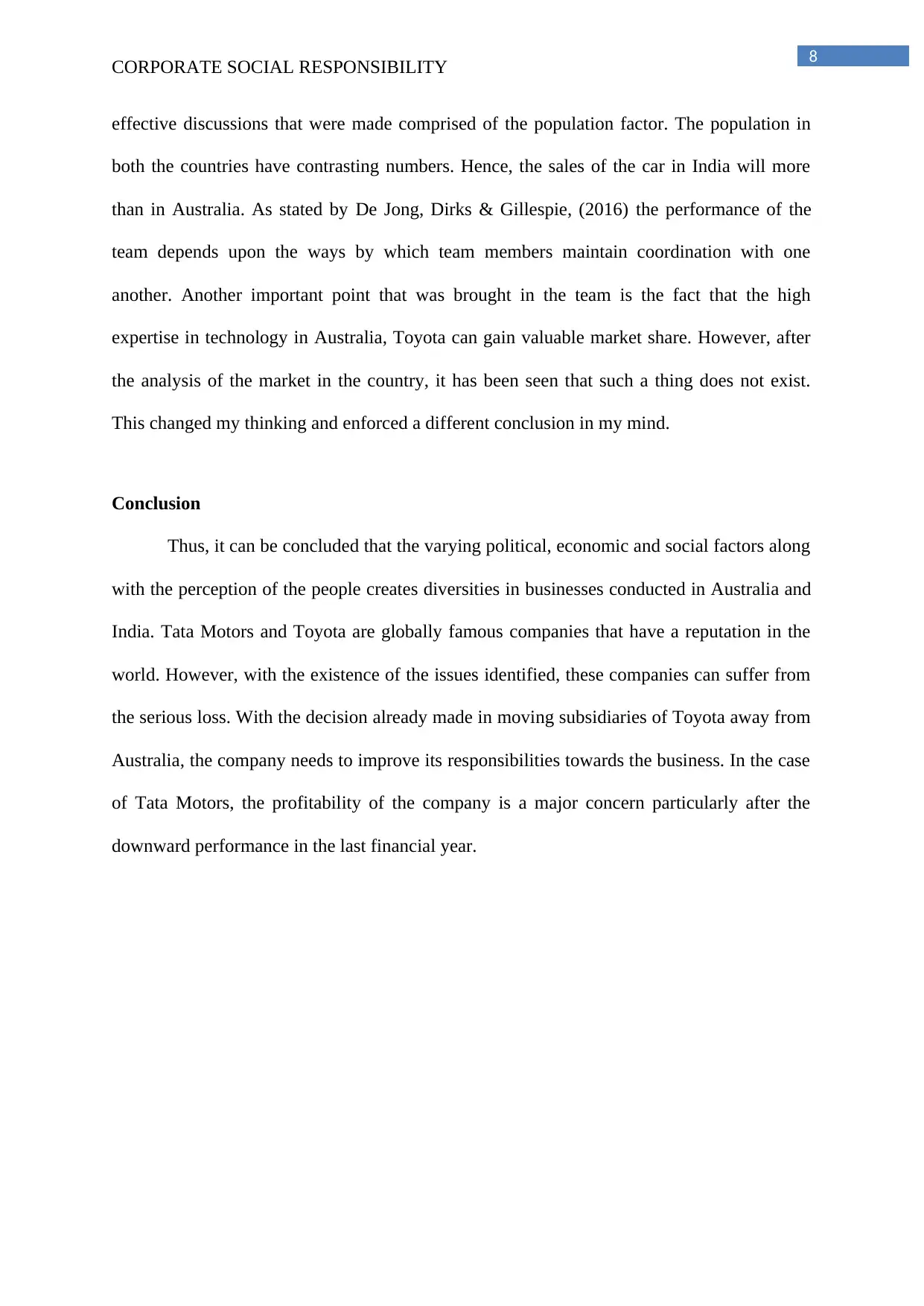
8
CORPORATE SOCIAL RESPONSIBILITY
effective discussions that were made comprised of the population factor. The population in
both the countries have contrasting numbers. Hence, the sales of the car in India will more
than in Australia. As stated by De Jong, Dirks & Gillespie, (2016) the performance of the
team depends upon the ways by which team members maintain coordination with one
another. Another important point that was brought in the team is the fact that the high
expertise in technology in Australia, Toyota can gain valuable market share. However, after
the analysis of the market in the country, it has been seen that such a thing does not exist.
This changed my thinking and enforced a different conclusion in my mind.
Conclusion
Thus, it can be concluded that the varying political, economic and social factors along
with the perception of the people creates diversities in businesses conducted in Australia and
India. Tata Motors and Toyota are globally famous companies that have a reputation in the
world. However, with the existence of the issues identified, these companies can suffer from
the serious loss. With the decision already made in moving subsidiaries of Toyota away from
Australia, the company needs to improve its responsibilities towards the business. In the case
of Tata Motors, the profitability of the company is a major concern particularly after the
downward performance in the last financial year.
CORPORATE SOCIAL RESPONSIBILITY
effective discussions that were made comprised of the population factor. The population in
both the countries have contrasting numbers. Hence, the sales of the car in India will more
than in Australia. As stated by De Jong, Dirks & Gillespie, (2016) the performance of the
team depends upon the ways by which team members maintain coordination with one
another. Another important point that was brought in the team is the fact that the high
expertise in technology in Australia, Toyota can gain valuable market share. However, after
the analysis of the market in the country, it has been seen that such a thing does not exist.
This changed my thinking and enforced a different conclusion in my mind.
Conclusion
Thus, it can be concluded that the varying political, economic and social factors along
with the perception of the people creates diversities in businesses conducted in Australia and
India. Tata Motors and Toyota are globally famous companies that have a reputation in the
world. However, with the existence of the issues identified, these companies can suffer from
the serious loss. With the decision already made in moving subsidiaries of Toyota away from
Australia, the company needs to improve its responsibilities towards the business. In the case
of Tata Motors, the profitability of the company is a major concern particularly after the
downward performance in the last financial year.
⊘ This is a preview!⊘
Do you want full access?
Subscribe today to unlock all pages.

Trusted by 1+ million students worldwide
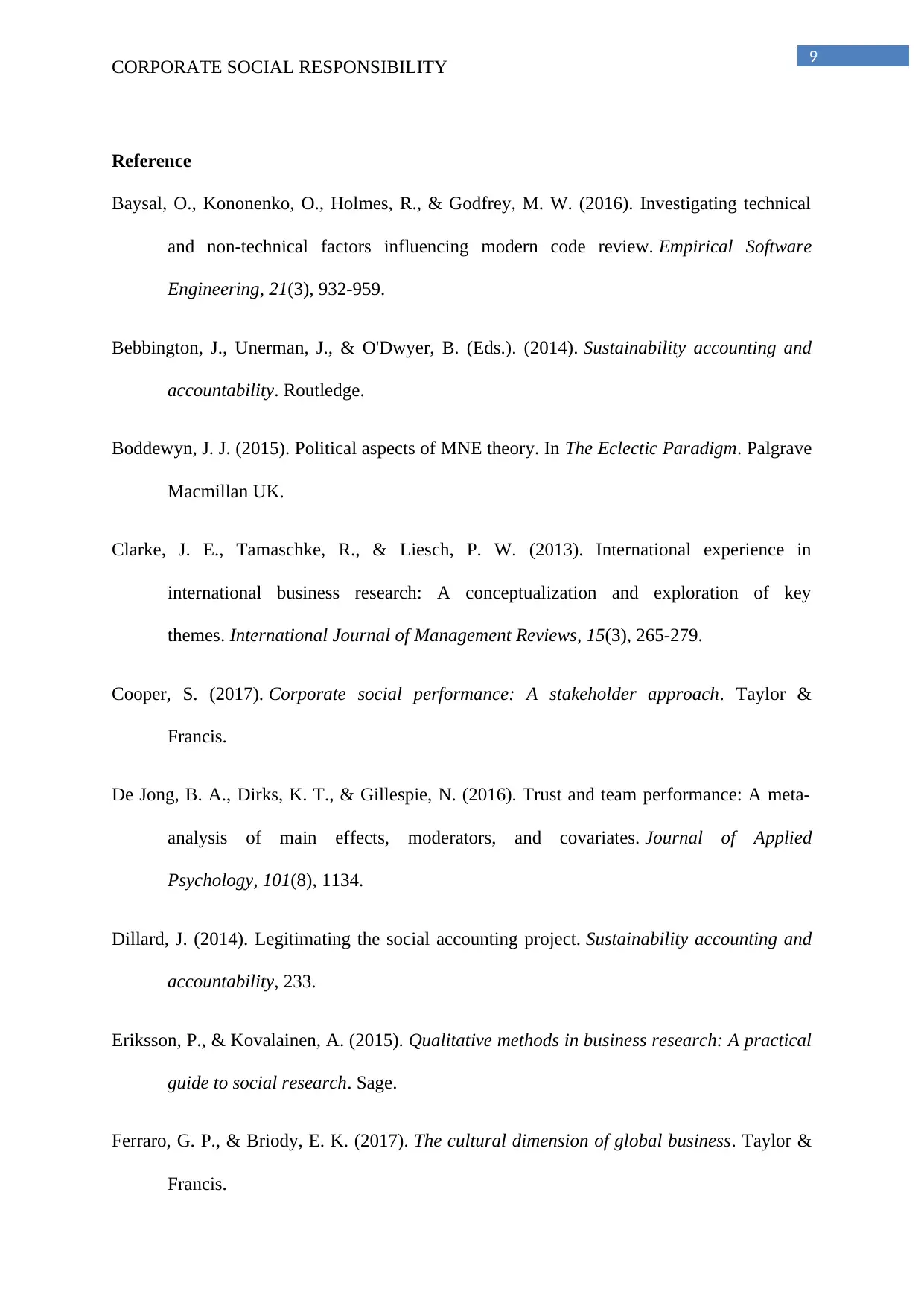
9
CORPORATE SOCIAL RESPONSIBILITY
Reference
Baysal, O., Kononenko, O., Holmes, R., & Godfrey, M. W. (2016). Investigating technical
and non-technical factors influencing modern code review. Empirical Software
Engineering, 21(3), 932-959.
Bebbington, J., Unerman, J., & O'Dwyer, B. (Eds.). (2014). Sustainability accounting and
accountability. Routledge.
Boddewyn, J. J. (2015). Political aspects of MNE theory. In The Eclectic Paradigm. Palgrave
Macmillan UK.
Clarke, J. E., Tamaschke, R., & Liesch, P. W. (2013). International experience in
international business research: A conceptualization and exploration of key
themes. International Journal of Management Reviews, 15(3), 265-279.
Cooper, S. (2017). Corporate social performance: A stakeholder approach. Taylor &
Francis.
De Jong, B. A., Dirks, K. T., & Gillespie, N. (2016). Trust and team performance: A meta-
analysis of main effects, moderators, and covariates. Journal of Applied
Psychology, 101(8), 1134.
Dillard, J. (2014). Legitimating the social accounting project. Sustainability accounting and
accountability, 233.
Eriksson, P., & Kovalainen, A. (2015). Qualitative methods in business research: A practical
guide to social research. Sage.
Ferraro, G. P., & Briody, E. K. (2017). The cultural dimension of global business. Taylor &
Francis.
CORPORATE SOCIAL RESPONSIBILITY
Reference
Baysal, O., Kononenko, O., Holmes, R., & Godfrey, M. W. (2016). Investigating technical
and non-technical factors influencing modern code review. Empirical Software
Engineering, 21(3), 932-959.
Bebbington, J., Unerman, J., & O'Dwyer, B. (Eds.). (2014). Sustainability accounting and
accountability. Routledge.
Boddewyn, J. J. (2015). Political aspects of MNE theory. In The Eclectic Paradigm. Palgrave
Macmillan UK.
Clarke, J. E., Tamaschke, R., & Liesch, P. W. (2013). International experience in
international business research: A conceptualization and exploration of key
themes. International Journal of Management Reviews, 15(3), 265-279.
Cooper, S. (2017). Corporate social performance: A stakeholder approach. Taylor &
Francis.
De Jong, B. A., Dirks, K. T., & Gillespie, N. (2016). Trust and team performance: A meta-
analysis of main effects, moderators, and covariates. Journal of Applied
Psychology, 101(8), 1134.
Dillard, J. (2014). Legitimating the social accounting project. Sustainability accounting and
accountability, 233.
Eriksson, P., & Kovalainen, A. (2015). Qualitative methods in business research: A practical
guide to social research. Sage.
Ferraro, G. P., & Briody, E. K. (2017). The cultural dimension of global business. Taylor &
Francis.
Paraphrase This Document
Need a fresh take? Get an instant paraphrase of this document with our AI Paraphraser
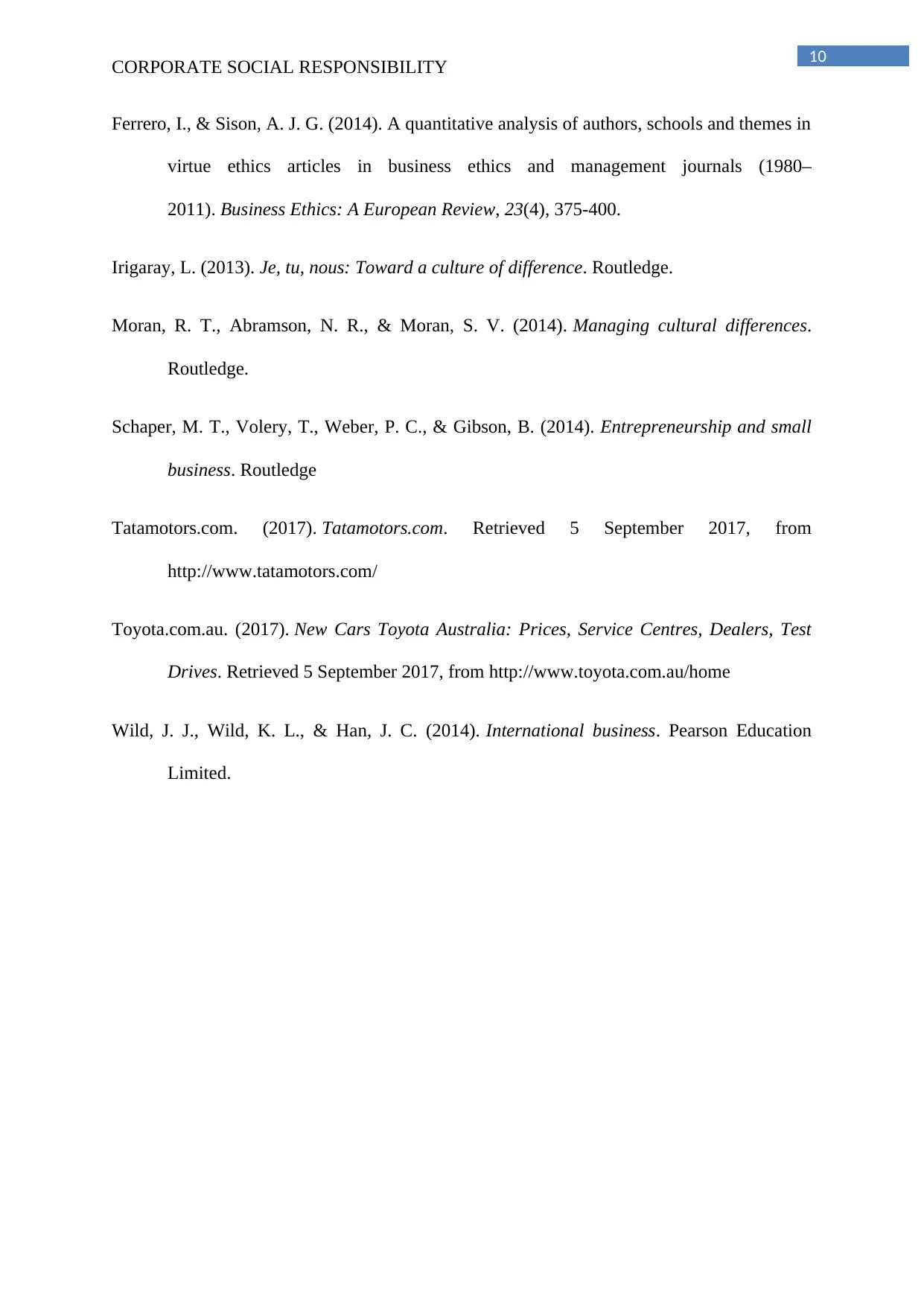
10
CORPORATE SOCIAL RESPONSIBILITY
Ferrero, I., & Sison, A. J. G. (2014). A quantitative analysis of authors, schools and themes in
virtue ethics articles in business ethics and management journals (1980–
2011). Business Ethics: A European Review, 23(4), 375-400.
Irigaray, L. (2013). Je, tu, nous: Toward a culture of difference. Routledge.
Moran, R. T., Abramson, N. R., & Moran, S. V. (2014). Managing cultural differences.
Routledge.
Schaper, M. T., Volery, T., Weber, P. C., & Gibson, B. (2014). Entrepreneurship and small
business. Routledge
Tatamotors.com. (2017). Tatamotors.com. Retrieved 5 September 2017, from
http://www.tatamotors.com/
Toyota.com.au. (2017). New Cars Toyota Australia: Prices, Service Centres, Dealers, Test
Drives. Retrieved 5 September 2017, from http://www.toyota.com.au/home
Wild, J. J., Wild, K. L., & Han, J. C. (2014). International business. Pearson Education
Limited.
CORPORATE SOCIAL RESPONSIBILITY
Ferrero, I., & Sison, A. J. G. (2014). A quantitative analysis of authors, schools and themes in
virtue ethics articles in business ethics and management journals (1980–
2011). Business Ethics: A European Review, 23(4), 375-400.
Irigaray, L. (2013). Je, tu, nous: Toward a culture of difference. Routledge.
Moran, R. T., Abramson, N. R., & Moran, S. V. (2014). Managing cultural differences.
Routledge.
Schaper, M. T., Volery, T., Weber, P. C., & Gibson, B. (2014). Entrepreneurship and small
business. Routledge
Tatamotors.com. (2017). Tatamotors.com. Retrieved 5 September 2017, from
http://www.tatamotors.com/
Toyota.com.au. (2017). New Cars Toyota Australia: Prices, Service Centres, Dealers, Test
Drives. Retrieved 5 September 2017, from http://www.toyota.com.au/home
Wild, J. J., Wild, K. L., & Han, J. C. (2014). International business. Pearson Education
Limited.
1 out of 11
Related Documents
Your All-in-One AI-Powered Toolkit for Academic Success.
+13062052269
info@desklib.com
Available 24*7 on WhatsApp / Email
![[object Object]](/_next/static/media/star-bottom.7253800d.svg)
Unlock your academic potential
Copyright © 2020–2025 A2Z Services. All Rights Reserved. Developed and managed by ZUCOL.





